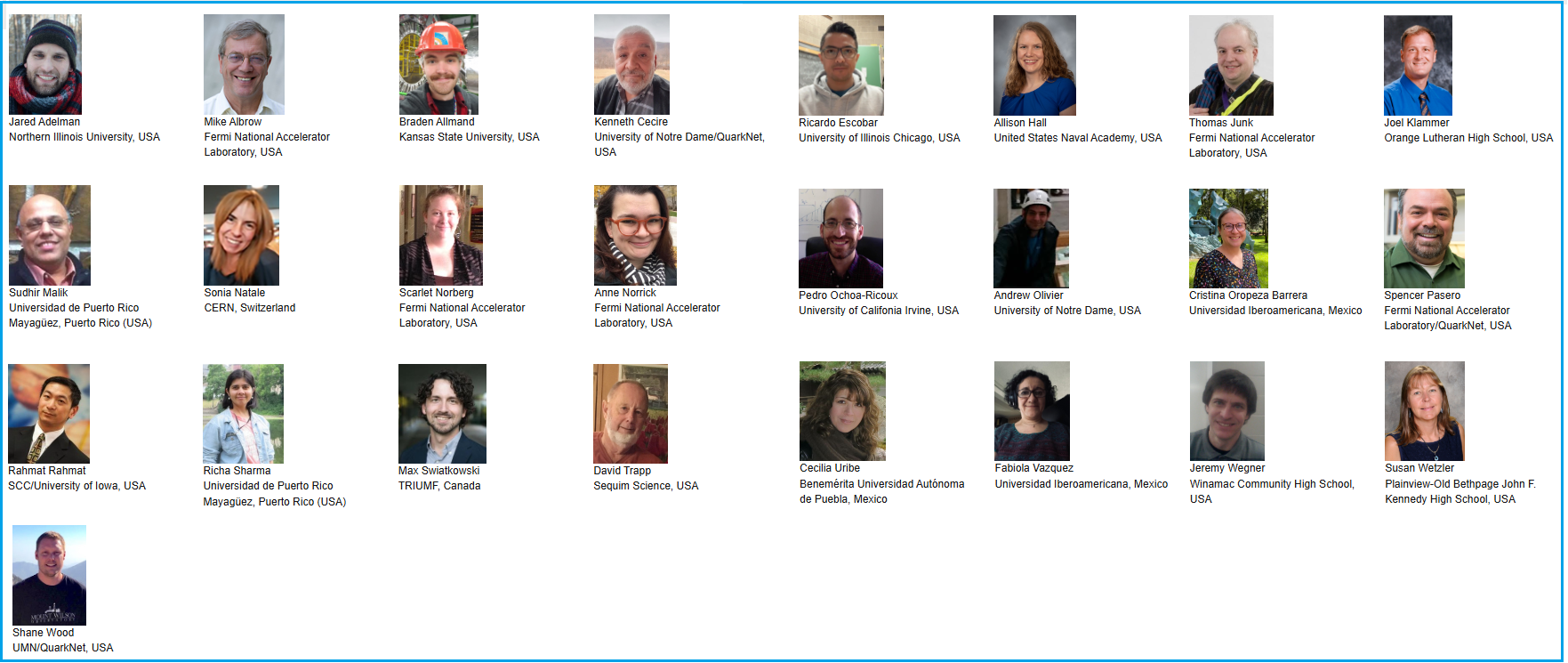Friday Flyer - April 18, 2025

Spotlight on International Masterclasses 2025
International Masterclasses 2025 concluded a week ago...well, almost. (More on that later.)
It was another active year from the QuarkNet and Fermilab point-of-view. There were 27 videoconferences hosted by Fermilab to accommodate 22 masterclasses at QuarkNet centers and 19 masterclasses among our international partners. An additional 3 QuarkNet centers participated without a videoconference. CMS masterclasses were the most popular: there were 27 of these, followed by 8 ATLAS, 6 NOvA, and 3 MINERvA. Our student numbers are not compiled yet, but it is safe to say that 800-1000 likely participated, with around 500 of these from QuarkNet centers. You can parse statistics your own way at the Communicate Your Results page in the Masterclass Library.
Beyond the statistics, the masterclasses this year were pretty stable, with few new features. For masterclasses that decide not to or cannot have a videoconference, we are piloting a way for them to participate in the worldwide collaboration by sharing their results, insights, and questions. Look for that in an LHC or Neutrino Data Workshop near you this summer!
A big thanks goes out to the QuarkNet mentors and teachers who made our masterclasses the great success they have been. You know who you are! Another great thanks to the physicists—and a few fellows and staff—who gave their time to moderate videoconferences, which were for the most part on time, tight, and interesting, maybe the best in years.
About the almost: TRIUMF in Vancouver will host a videoconference for ATLAS masterclasses in British Columbia and at Berkeley Lab in about a week. We wish them great success.

Fermilab/QuarkNet International Masterclasses 2025 Videoconference moderators!

News from QuarkNet Central
Coding Camp 1: QuarkNet Coding Camp 1 is a one-week remote workshop for teachers where you'll learn to code in Python, analyze particle physics data, and practice integrating that into your own curriculum with reformed pedagogy. Learn more on the Coding Camp 1 2025 page and then, if you think it is for you, fill out the application by the May 25 deadline.
Teacher Research Associates (TRAC): TRAC is an eight-week program that provides outstanding science, mathematics, computer science and technology teachers with professional summer research experience. Visit the TRAC website for more information, including how to apply. Applications have been extended and are now due Friday April 25.
Center mentors and lead teachers: QuarkNet has begun sending out award letters to centers. Now is a good time to think about dates and topics for teacher workshops this coming summer. Remember that QuarkNet has several National Workshops that QuarkNet staff and/or fellows can bring to your center. New offerings include workshops on Cosmic Watches and on AI. If you have any questions, please contact your QuarkNet staff member.
Congratulations: Danelix Cordero of the University of Puerto Rico center has two students, Sara Lu and Diego Roura, who have in the won the NASA HUNCH Engineering and Software Fair for the past two years. They recently presented their software projects at the Johnson Space Center in Houston! The first year, they offered a research project, "Applying Artificial Intelligence for Psychological Evaluation," using Machine Learning, and this year, they developed an AI-Software-Server farm programming in Python.

Physics Experiment Roundup
Trying to learn more about the primordial soup at the beginning of the universe? Go ask ALICE: according to APS Physics, recent experimental results show that the soup contained all six quark flavors.
We also have a lot of news from the CERN Bulletin. The Accelerator Report shows things looking good for the LHC. ATLAS is revealing new insights into the Higgs mechanism and, over at NA61/SHINE physicists are seeing broken symmetries between up and down quarks. The AEgIS experiment, meanwhile, is using smartphone sensors to detect antimatter. There must be an app for that.

Resources
The CERN Bulletin keeps on giving us news. In particular, the big news is that the four LHC experiments were awarded the Breakthrough Prize on April 5 for “detailed measurements of Higgs boson properties confirming the symmetry-breaking mechanism of mass generation, the discovery of new strongly interacting particles, the study of rare processes and matter-antimatter asymmetry, and the exploration of nature at the shortest distances and most extreme conditions at CERN’s Large Hadron Collider”. Wowsers.
And CERN Bulletin keeps on going with some past and some possible future: A journey through CERN’s past in black and white and a feasibility report on the Future Circular Collider. APS Physics goes the same chronological route: a peek at the birth of quantum mechanics and a new way to dig for dark matter.

Just for Fun
We will go light on the fun today, sticking with xkcd, specifically anti-De Sitter space, photon poetry (ouch), push notifications, iPhone decay, and no need for redshift.
Well, if you want a little more: FF recently re-watched Mark Adams' Search for hidden chambers using cosmic-ray muons video and it still is really good!
QuarkNet Staff
Mark Adams: adams@fnal.gov
Ken Cecire: kcecire@nd.edu
Spencer Pasero: spasero@fnal.gov
Shane Wood: swood5@nd.edu
